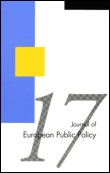
JOURNAL OF EUROPEAN PUBLIC POLICY
Scope & Guideline
Illuminating the Path of Public Policy in Europe
Introduction
Aims and Scopes
- European Governance Dynamics:
The journal explores the processes and structures through which policies are formulated, implemented, and evaluated within the EU and its member states, focusing on multi-level governance. - Political Behavior and Electoral Dynamics:
It investigates how political parties, interest groups, and citizens engage with and respond to public policies, particularly in the context of electoral politics and populism. - Policy Integration and Differentiation:
The journal examines how different policy areas interact and the implications of differentiated integration within the EU, addressing issues such as policy coherence and fragmentation. - Crisis Management and Policy Adaptation:
It analyzes the responses of EU institutions and member states to crises, such as the COVID-19 pandemic and the refugee crisis, highlighting adaptive policy strategies and governance challenges. - Public Opinion and Legitimacy:
The journal assesses how public perceptions of policies and institutions affect legitimacy, accountability, and trust in governance, particularly in relation to EU policies. - Comparative Policy Analysis:
It offers comparative studies of public policies across member states, focusing on how national contexts influence policy outcomes and the role of transnational factors.
Trending and Emerging
- Crisis Governance and Resilience:
A significant trend is the focus on governance responses to crises, such as the COVID-19 pandemic and the geopolitical challenges posed by the Russian invasion of Ukraine, highlighting adaptive strategies and resilience in policy-making. - Digital Sovereignty and Regulation:
Emerging discussions around digital sovereignty, data governance, and regulatory frameworks reflect the growing importance of technology in public policy, particularly in relation to privacy and security. - Climate Policy and Environmental Governance:
There is an increasing emphasis on climate change and environmental policies, with studies examining the interplay between economic recovery, sustainability, and EU climate commitments. - Populism and Democratic Backsliding:
Research investigating the impacts of populism on democratic processes and public trust in institutions has gained momentum, reflecting concerns about the integrity of democratic governance in Europe. - Transnational Cooperation and Policy Learning:
An emerging focus on transnational coalitions and policy learning among EU member states indicates a shift towards collaborative approaches in addressing shared challenges, moving beyond national silos.
Declining or Waning
- Traditional Economic Governance Models:
There has been a noticeable reduction in articles focusing on conventional economic governance frameworks, as newer approaches to economic policy, particularly in response to crises, have gained traction. - Nationalism and Sovereignty in Policy Discourse:
While nationalism was a prominent theme in earlier years, recent publications indicate a waning interest as scholars shift towards exploring transnationalism and collaborative governance in the EU. - Static Institutional Analysis:
The analysis of EU institutions as static entities has declined, with a growing preference for dynamic studies that account for the evolving nature of EU governance and policy-making. - Focus on Historical Policy Contexts:
There is less emphasis on historical analyses of EU policies, as contemporary issues and future-oriented research have become more central to the journal's discourse. - Regional Policy Disparities:
Research centered on regional disparities within the EU has diminished, reflecting a broader trend towards understanding policy impacts at the national and supranational levels rather than regional nuances.
Similar Journals

EUROPEAN JOURNAL OF POLITICAL RESEARCH
Elevating Scholarly Discourse in Political StudiesEUROPEAN JOURNAL OF POLITICAL RESEARCH, published by Wiley, stands as a leading platform for scholarly discourse within the realms of sociology and political science. This esteemed journal, identified by its ISSN 0304-4130 and E-ISSN 1475-6765, has maintained a rigorous academic standard since its inception in 1973 and continues to publish until 2024. Ranked in the top 2% of its field, it is categorized as Q1 in both Sociology and Political Science, reflecting its position at the forefront of impactful research. With a prestigious Scopus rank of #32 out of 1,466 journals, the EUROPEAN JOURNAL OF POLITICAL RESEARCH is essential for researchers, professionals, and students looking to deepen their understanding of contemporary political phenomena and sociological theories. Although the journal does not currently offer open access, its contributions are vital for anyone engaged in serious academic exploration of political research, providing readers with insights that shape practices and policies across Europe and beyond.
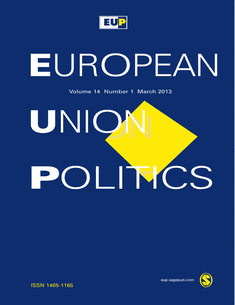
EUROPEAN UNION POLITICS
Charting the Course of EU Political DevelopmentsEUROPEAN UNION POLITICS, published by SAGE PUBLICATIONS LTD, is a premier journal in the realm of political science, specializing in the intricate dynamics of the European Union and its multifaceted impact on global governance. With an ISSN of 1465-1165 and an E-ISSN of 1741-2757, this journal serves as a critical platform for scholarly discourse, featuring articles that address pressing political issues and policy debates affecting EU member states and beyond. The journal's significance is underscored by its impressive impact factor and a remarkable position in the Q1 category across various disciplines, including Demography and Health (Social Science), as well as Political Science and International Relations. With a strong Scopus ranking, notably Rank #70 out of 706 in Political Science and International Relations (90th percentile), it attracts a diverse array of contributions from leading academics and practitioners. The scope of EUROPEAN UNION POLITICS spans analyses of EU policies, member state interactions, and broader implications for international relations, making it an essential resource for researchers, professionals, and students engaged in understanding the ever-evolving political landscape of Europe.

Constitutional Political Economy
Advancing Insights on Constitutional Frameworks and Economic OutcomesConstitutional Political Economy, published by Springer, is a leading journal in the interdisciplinary field that examines the relationship between constitutional frameworks and economic behavior. With its ISSN 1043-4062 and E-ISSN 1572-9966, the journal has established itself as a significant contributor to discussions in Economics, Law, Philosophy, and Sociology and Political Science, ranking impressively across multiple categories with an impact factor that reflects its scholarly influence: Q3 in Economics and Econometrics, Q2 in Law, Q1 in Philosophy, and Q2 in Sociology and Political Science as of 2023. The journal's scope encompasses theoretical and empirical research that informs the intersections of constitutions and political economy from a variety of perspectives. Published continuously since 1990, it invites contributions from researchers, professionals, and students keen on exploring how constitutional principles shape economic policies and societal outcomes. Although it does not currently offer Open Access options, the insights gleaned from its articles are vital for any academic or practitioner interested in the role of governance in economic systems.

Europolity-Continuity and Change in European Governance
Connecting Scholars and Practitioners in EuropeEuropolity-Continuity and Change in European Governance, an esteemed journal published by the NATL SCH POLITICAL STUDIES & PUBLIC ADM, delves into the dynamic landscape of European governance, addressing the intricate balance of continuity and change within its frameworks. Established as an Open Access journal since 2007, it aims to disseminate innovative research that fosters dialogue among scholars, policymakers, and practitioners in the fields of political science and public administration. With its ISSN 2344-2255 and E-ISSN 2247-7721, Europolity invites contributions that explore topical issues ranging from policy analysis to governance structures across Europe, making it an invaluable resource for researchers and professionals seeking to understand the complexities of European governance. The journal’s commitment to accessibility and academic rigor ensures that it remains a pivotal platform for thought leadership and scholarly discourse in its discipline.

Politics and Governance
Connecting Scholars to Evolving Political LandscapesPolitics and Governance is an esteemed academic journal published by COGITATIO PRESS, focusing on critical discourse in the field of public administration, sociology, and political science. Since its inception in 2013, this open-access journal has established itself as a vital platform for innovative research and discourse, currently enjoying a commendable Q2 ranking in Public Administration and a prestigious Q1 ranking in Sociology and Political Science as of 2023. With an impressive Scopus ranking, placing it in the 86th and 74th percentiles for sociology and public administration respectively, Politics and Governance aims to disseminate quality scholarly articles that contribute to the understanding of political dynamics and governance structures. Through its commitment to open access, the journal ensures that valuable research is accessible to a global audience, fostering a diverse academic dialogue that is essential for evolving the field. Based in Lisbon, Portugal, the journal serves as a crucial resource for researchers, professionals, and students striving to engage meaningfully with contemporary issues in governance and policy.
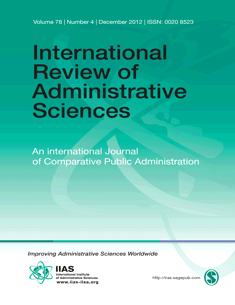
INTERNATIONAL REVIEW OF ADMINISTRATIVE SCIENCES
Pioneering insights in administrative science since 1957.INTERNATIONAL REVIEW OF ADMINISTRATIVE SCIENCES, published by SAGE PUBLICATIONS LTD, is a premier academic journal dedicated to advancing the field of public administration, sociology, and political science. With an impressive Impact Factor reflecting its importance, the journal is ranked in the Q1 category for both public administration and sociology/political science, showcasing its rigorous peer-review process and high-quality research publications. Established in 1957, it continues to provide valuable insights and innovative scholarship, paving the way for future research and practical applications in governance and administration. The journal's editorial aim is to foster scholarly dialogue among researchers, practitioners, and policymakers, contributing to the understanding of efficient and effective public service management. While it is not an open-access journal, the INTERNATIONAL REVIEW OF ADMINISTRATIVE SCIENCES remains an essential resource for academics and professionals seeking to deepen their knowledge and engage with contemporary issues in administrative science.
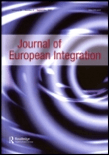
Journal of European Integration
Connecting Scholars to the Heart of European StudiesJournal of European Integration is a leading academic journal dedicated to the study of European politics and the dynamics of European integration. Published by Routledge Journals, part of the esteemed Taylor & Francis Ltd, this journal has established itself as a premier outlet for high-quality research, reflected in its Q1 category rankings in both Political Science and International Relations, as well as in Sociology. With a robust publication history spanning from 1977 to 2024, it offers vital insights into the complexities of political structures and societal impacts within Europe. Notably, it ranks in the 95th percentile in Political Science and International Relations and the 92nd percentile in Sociology, presenting a significant platform for scholars and practitioners alike. Although it does not currently offer Open Access options, the journal's comprehensive content serves as an essential resource for those engaged in understanding contemporary European issues and policy debates. Researchers, professionals, and students will find the Journal of European Integration to be an indispensable source of knowledge and academic discourse.
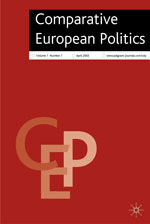
Comparative European Politics
Bridging Theories and Practices in European PoliticsComparative European Politics is a leading academic journal dedicated to the nuanced exploration of political systems, policies, and behaviors across Europe. Published by Palgrave Macmillan Ltd, this esteemed journal has carved out a significant niche in the study of Political Science and International Relations, holding a prestigious Q1 ranking in its field as of 2023. The journal is recognized for its rigorous peer-reviewed articles that contribute to the advancement of knowledge and understanding in the discipline, making it an essential resource for scholars, practitioners, and students alike. With an impressive Scopus rank placing it in the 82nd percentile among its peers, Comparative European Politics provides a platform for innovative research and critical discussions, ultimately aiming to shape policymaking and theoretical frameworks across Europe. While currently not an open-access journal, it continues to offer various access options to ensure its findings are disseminated widely, further amplifying its impact on contemporary political discourse.
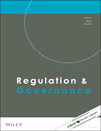
Regulation & Governance
Fostering Dialogue on Governance DynamicsRegulation & Governance is a prestigious academic journal published by WILEY, dedicated to the rigorous examination of the dynamics of regulation and governance across diverse contexts. With an ISSN of 1748-5983 and an E-ISSN of 1748-5991, this journal serves as a crucial platform for both theoretical and empirical research spanning the fields of Law, Public Administration, and Sociology and Political Science. Notably, it has achieved a remarkable Q1 classification in the 2023 Journal Quality Assessment, positioning it among the top-tier journals in these disciplines. The journal boasts impressive Scopus rankings, including 20th in Law and 22nd in Public Administration, reflecting its global impact and relevance. With a focus on contributing to meaningful policy debates and fostering an understanding of regulatory frameworks, Regulation & Governance is essential reading for researchers, practitioners, and students aiming to engage with contemporary governance challenges. The journal operates under a traditional subscription model, providing rich insights while maintaining a commitment to academic excellence from its United Kingdom base at 111 River St, Hoboken, NJ.
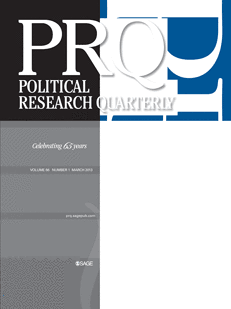
POLITICAL RESEARCH QUARTERLY
Navigating the Evolving Landscape of Political ThoughtPOLITICAL RESEARCH QUARTERLY is a leading academic journal published by SAGE Publications Inc, focused on advancing the understanding of politics through rigorous, empirical research. With an established history dating back to 1948, this journal has adapted to the evolving landscape of political science, showcasing the latest developments and theoretical frameworks in the field. Ranked in the Q1 quartile for both Sociology and Political Science, it holds significant prestige, with a current Scopus ranking of #332 out of 1466 in its category, placing it in the top 77th percentile of journals. While it does not currently offer open access, its comprehensive scope encompasses a wide array of political topics, making it an invaluable resource for researchers, professionals, and students aiming to deepen their insights into political behavior, institutions, and policy analysis. Access to the journal's rich content is crucial for those looking to engage with the forefront of political research and application, ensuring it remains a vital part of scholarly discourse.